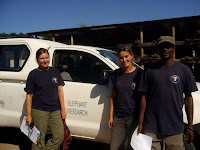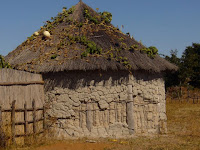We booked into Ashanti and reserved a triple room, so it was quite luxurious. (Ashanti is a GREAT hostel by the way, definitely recommended!! Great for the slightly older traveller, meaning they have a separate guesthouse with private rooms that are huge, very clean, lovely decor and very quiet.)
It's the winter now in Southern Africa, and we’d heard lots of horror stories about the winter weather in Cape Town. Apparently it rains pretty much all the time and it can get really miserable. However the luck was for once on our side and our first morning here started with beautiful sunshine and a clear sky. Perfect day to visit the Table Mountain! We got a cab to the cable car and while Minna and Kaisa joined the queue I went to enquire about a map at the info centre. They didn’t have any maps, but the girl working there somehow managed to convince me that it would be a much better idea to walk up rather than take the cable car: “Only about one and half hours walk”. So up we walked. Except for it wasn’t a one and a half hours walk, but almost a three-hour hard-core climb, at times on all fours. We practically speaking died several times (apart from our marathon-runner Kaisa), it was so bad. The only thing that kept us going was the thought of re-visiting the info centre once down, so we could strangle the girl working there. We were so not prepared for the hike and had hardly any water with us. I drank from a stream coming down the hill hoping that it wasn’t the drain from the restaurant at the top, it got so desperate.
 But believe it or not, we made it to the top, where we corked a bottle of bubbly Kaisa had kindly carried in her backpack all the way there. Yes, it tasted great! (Afterwards we found a long list of equipment in our guide books recommended for the Table Mountain hike, including torches and whistles. We only had a bottle of bubbly and three plastic wine glasses…)
But believe it or not, we made it to the top, where we corked a bottle of bubbly Kaisa had kindly carried in her backpack all the way there. Yes, it tasted great! (Afterwards we found a long list of equipment in our guide books recommended for the Table Mountain hike, including torches and whistles. We only had a bottle of bubbly and three plastic wine glasses…)The lovely weather held up for the rest of the week and we were able to hire a car and drive down to the Cape of Good Hope and the Cape Point.
 Driving in South Africa was one thing I’d sworn definitely not to do (too much traffic, not very safe, etc) but renting a car was too cheap to resist, plus the public transport isn’t great. It was fine apart from finding our way out of Cape Town took a very long time. The road we wanted to take was closed and the alternative scenic route simply didn’t exist outside the map but at least we got a very thorough sightseeing tour of the suburbs. We spent the night in Simon’s Town (we never found out who was this Simon, even though we kept asking and asking) which is a cute little coastal town about an hour’s drive south of CT. Penguins also like Simon’s town so much that they live there in their hundreds, so we got to see lots of them. They’re the small jackass ones, really really cute! I managed to kidnap one as it fitted perfectly in my back-pack (ok I didn’t but I really wanted to).
Driving in South Africa was one thing I’d sworn definitely not to do (too much traffic, not very safe, etc) but renting a car was too cheap to resist, plus the public transport isn’t great. It was fine apart from finding our way out of Cape Town took a very long time. The road we wanted to take was closed and the alternative scenic route simply didn’t exist outside the map but at least we got a very thorough sightseeing tour of the suburbs. We spent the night in Simon’s Town (we never found out who was this Simon, even though we kept asking and asking) which is a cute little coastal town about an hour’s drive south of CT. Penguins also like Simon’s town so much that they live there in their hundreds, so we got to see lots of them. They’re the small jackass ones, really really cute! I managed to kidnap one as it fitted perfectly in my back-pack (ok I didn’t but I really wanted to). The following day we had the best breakfast in a little patisserie called the Sweetest Thing, please make note of this if you ever end up in Simon’s Town! Mmmmm…. After some more penguin-spotting we drove up the road to Muizenberg where I wasn’t planning to surf at all, no, I just wanted to quickly have a look at the waves. But they were too perfect to give a miss so soon I found myself in the water giving Kaisa her first ever surfing lesson. I hope she caught the bug!
Back in CT that night, we parked our car outside the hostel and headed out for some shopping. The shopping centre (Victoria Wharf) was big and we had a few more ‘ryssat Anttilassa” moments, it was SOOO nice to shop & being able to wear new clothes rather than choose from the five smelly t-shirts I’d been wearing since March. Another beautiful dinner with some beautiful wine and we went to bed knackered, ready to get up early for a Wine Tour in the following morning. As we were waiting to be picked up we had a lovely surprise: During the night a bus had smashed into our rental car and the whole of the driver’s side was damaged and the mirror broken off. Always a nice thing to having to deal with…. But there wasn’t much we could do about it at that moment as the wine was waiting for us.
An all-day wine tour with a guide and a driver was certainly a memorable experience! We visited four different vineyards and tasted 27 different wines, quite generous portions as well.
 The only problem was that after the fifth one they all just tasted wonderful… Later on that night we met up with some others from the wine tour in Mama Africa (restaurant), and tried a couple of bars in Long Street. We finished off the night by opening one of the bottles of bubbly we’d bought from the vineyard at the hostel porch and reminiscing about the past few weeks. For it was our last night in Africa.
The only problem was that after the fifth one they all just tasted wonderful… Later on that night we met up with some others from the wine tour in Mama Africa (restaurant), and tried a couple of bars in Long Street. We finished off the night by opening one of the bottles of bubbly we’d bought from the vineyard at the hostel porch and reminiscing about the past few weeks. For it was our last night in Africa. Sunday started off not so great: it was pissing down with rain, we had to pack, visit a police station and sort out the smashed rental car. Very depressing. After some brunch in Lola’s café Minna and Kaisa had to leave to the airport, I still had a couple of hours to kill, so I spent the remaining time wisely by finding the perfect wooden hippo.
I’ve got ten minutes until a taxi is due to pick me up. Don’t want to go, no no no. Maybe the flight will be cancelled due to bad weather? Maybe there will be a high-jack and the plane will be re-directed to Mozambique? Fingers crossed.













































